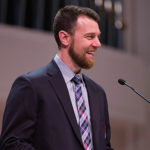Posted: 11/02/06
Bible Studies for Life Series for November 12
Place your trust in God, not things of the world
• Isaiah 8:18–9:7
By Kenneth Lyle
Logsdon School of Theology, Abilene
Certainty in an uncertain world—a commodity that many seek, but few find. At times in our lives, both individually and as community, we find it difficult to maintain a sense of hope and purpose. Even a cursory glance at the newspaper or television news broadcast reveals a world that is at best, strained to its limit, and at worst, tearing apart at the seams.
How do God’s people live in such a world? We might imagine there never before has been such a challenging time to live as God’s people. We might believe our world never before has been so close to destruction—that the darkness never has been quite so dark. Scripture shows us, however, that there have been and always will be difficult challenges facing those who hear God’s voice and follow his leading.
The focal passages from Isaiah 8:18-9:7 come in the midst of a series of messages Isaiah preached during the Syro-Ephraimite War (734-732 B.C.). Isaiah records in 7:1-2 the effort of Rezin, king of Syria, and Pekah, king of Israel, to defeat Judah and attack Jerusalem (2 Chronicles 28).
Isaiah understands these aggressive threats as God’s punishment of Judah because of the unfaithfulness of King Ahaz and the people. Isaiah recognizes Ahaz and the people seek guidance not from God but from “mediums and spiritists” (8:19). Isaiah mourns because the rich in Judah refuse to acknowledge the poor, and in some cases, they “… make unjust laws … oppressive decrees, to deprive the poor of their rights and withhold justice from the oppressed” (10:1-2).
Perhaps most distressing, Isaiah sees that Ahaz places trust in disastrous political alliances with the Assyrian king Tiglath-pileser III rather than in God (7:1-12, 2 Chron. 28:16).
In response to this state of affairs, Isaiah presents a series of messages that alternate between judgment (7:1-8:22; 9:8-10:34) and hope (9:1-7; 11:1-12:6). In 7:1-8:22, Isaiah presents a picture of judgment on God’s people.
From judgment comes hope: Isaiah proclaims the coming gladness over the establishment of God’s kingdom (9:1-7). In turn, judgment comes to Assyria (9:8-10:34) for its arrogance, pride and neglect of the poor; however, Isaiah’s optimism about the future culminates in further reflection about the coming reign (11:1-6) and the praise it will bring (12:1-6).
From Isaiah’s perspective, the coming Assyrian conquest of Judah is God’s way of dealing with the sad state of affairs in Judah generally and in Jerusalem in particular. As we have seen, in spite of the endless worship of God through empty sacrifice, the people neglect the weightier matters of doing good, seeking justice, defending the oppressed, taking care of orphans and pleading for widows (1:16-17).
While Ahaz and the people see the intervention of Assyria against Syria and Israel as deliverance, Isaiah understands God is acting to purge his people and prepare the way for a new reign (9:1-7).
How do Isaiah’s words to Ahaz and the people of Judah inform God’s people today? What principles within these historical circumstances speak to the question posed earlier: How do God’s people live in such a world? How do we move from darkness to light?
I would like to suggest three other questions that may help Christians reflect on what it means to live in light rather than darkness: Where do you put your trust? What do you expect God to do? What kind of world does God desire?
Isaiah painfully recognizes that many of God’s people were placing their trust in things other than God or God’s word. Ahaz trusted his alliance with Assyria so much that he refused to seek God’s leading (7:12). The people were placing their trust in “mediums and spiritists, who whisper and mutter” (8:18).
In the 21st century, we also might find individuals who place more credence in “psychic-hotlines” and fortune tellers, but many more people who place their trust in political slogans, self-help mantras and even religious quick fixes. When faced with the question, “Where do you put your trust?” many Christians might respond with their lips “In God and God’s word,” while actually placing trust in something far different.
Perhaps the reason for this disparity comes in reflection about the second question: “What do you expect God to do?”
Many suppose God only is concerned about the “end game.” That God will only weigh in when it matters most and when all things are finished, and so “I just have to hang on till Jesus comes!”
A simple reading of Scripture suggests this is not the way God works. Isaiah believed and proclaimed that God worked within history to effect change. Moreover, the New Testament writers understood Isaiah to be pointing to God’s ultimate intervention in history in and through the person Jesus. The overwhelming testimony of Scripture is that God works in the world to move the world from darkness to light.
If you imagine that God is simply going to remove his people from a dark and dying world this will fundamentally change how you live in the world. If you believe God actively is involved with the world through his people, then the light becomes something that overcomes the darkness. As God’s people move from darkness to light, they effect change in the world.
Finally, because the change from darkness to light effects change in the world, we need to think about the question, “What kind of world does God desire? Isaiah saw a world where God’s son reigns as “Wonderful Counselor, Mighty God, Everlasting Father, Prince of Peace” (9:6); a world where “of the increase of his government and peace there will be no end” (9:7). Isaiah envisioned a world where God’s people were so in tune with God’s purposes that justice reigns, poverty ends, homelessness stops and righteousness rules. It is a world that can and must be if we are to be God’s people moving from darkness to light.
Discussion questions
• In who or what do you place your trust? How do you demonstrate this in your everyday life?
• What do you expect God to do in the world? Do we as Christians have anything to do with fulfilling God’s expectations?
• What kind of world do you believe God envisions? Do Christians have some responsibility for helping create that world?















We seek to connect God’s story and God’s people around the world. To learn more about God’s story, click here.
Send comments and feedback to Eric Black, our editor. For comments to be published, please specify “letter to the editor.” Maximum length for publication is 300 words.